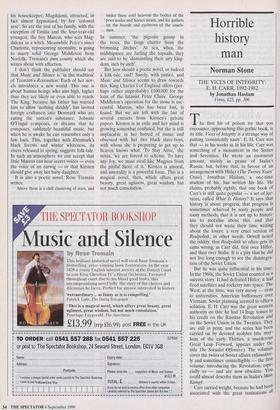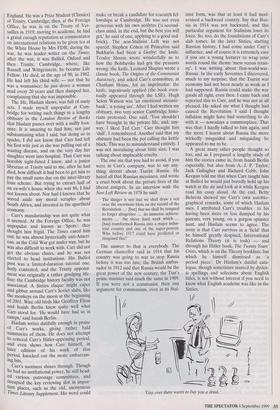Horrible history man
Norman Stone
THE VICES OF INTEGRITY: E. H. CARR, 1892-1982 by Jonathan Haslam Verso, £25, pp. 306 The first bit of poison ivy that you encounter, approaching this gothic book, is its title. Vices of Integrity is a strange way of putting 'consistently nasty'. E. H. Carr was that — in his works as in his life. Carr was something of a monument in the Sixties and Seventies. He wrote an enormous amount, mainly in praise of Stalin's Russia, but, before that, in favour of an arrangement with Hitler (The Twenty Years' Crisis). Jonathan Haslam, a one-time student of his, has written his life. He claims, probably rightly, that one book of Carr's is still quite popular — a set of lec- tures, called What Is History? It says that history is about progress, that progress is sometimes achieved by nasty people and nasty methods, that it is not up to histori- ans to moralise about this, and that they should not waste their time writing about the losers: a very cruel version of Realpolitik, in other words. Orwell noted the oddity, that Realpolitik so often gets its sums wrong, as Carr did, first over Hitler, and then over Stalin. It is a pity that he did not live long enough to see the disintegra- tion of the Soviet Union.
But he was quite influential in his time. In the 1960s, the Soviet Union counted as a success story. It had defeated Hitler; it had fired satellites and rocketry into space. The West, at the time, was very messy — riots in universities, American buffoonery over Vietnam. Soviet planning seemed to offer a solution. E. H. Carr was the great western authority on this: he had 14 huge tomes to his credit on the Russian Revolution and on the Soviet Union in the Twenties. TheY are still in print, and the series has been carried on by devoted acolytes (the may- hem of the early Thirties, a murderous Great Leap Forward, appears under the title The Socialist Offensive). The volumes cover the twists of Soviet affairs exhaustive- ly and sometimes unintelligibly — the first volume, introducing the Revolution, esPe" cially so — and are now obsolete. You could almost describe them as Stalin's Man Karnpf. Carr carried weight, because he had been associated with the great institutions of England. He was a Prize Student (Classics) of Trinity, Cambridge; then, at the Foreign Office, he was in on the Treaty of Ver- sailles in 1919; moving to academe, he had a grand enough reputation as commentator on international relations to be given tea at the White House by Mrs FDR; during the war, he was leader writer on the Times; after the war, it was Balliol, Oxford and then Trinity, Cambridge, where, like Russell and Wittgenstein, he became Life Fellow. He died, at the age of 90, in 1982. He had left his third wife — not that he was a womaniser; he just drove a woman mad every 20 years and then dumped her, complaining that she was impossible. The life, Haslam shows, was full of nasty acts. I made myself unpopular at Cam- bridge for writing such things in a lengthy obituary in the London Review of Books that Haslam passes over with a sniffy foot- note. It is amazing to find him, not just substantiating what I said, but doing so in spades. I did not know that Carr had left his first wife just as she was pulling out of a wasting disease, and on the very day her daughter went into hospital. That Carr was horribly tight-fisted I knew, and a junior librarian at Trinity said to me, after he had died, how difficult it had been to get him to pay the small sums due on the inter-library loan scheme. But trying to extract half of an ex-wife's house when she was 86, I had not known about. Nor had I known that he waved aside any moral scruples about South Africa, and invested in the apartheid economy. Carr's mandarinship was not quite what it seemed. At the Foreign Office, he was unpopular and known as 'Spots': they thought him frigid. The Times eased him out: he was almost hysterically anti-Ameri- can, as the Cold War got under way, but he was also difficult to work with. Carr did not get the obvious chairs, and he was not elected to head institutions. His Balliol post was a limited-duration tutorial one, hotly contested, and the Trinity appoint- ment was originally a rather grudging life- line: the Cambridge history faculty was not associated. A Sixties claque might caper and gibber around Carr's Soviet slabs, like the monkeys on the moon at the beginning of 2001. Wise old birds like Geoffrey Elton and Isaiah Berlin knew quite well what Carr stood for. 'He would have had us in Camps,' said Isaiah Berlin.
Haslam writes dutifully enough in praise of Carr's works, giving rather bald summaries of them. He does not attempt to conceal Carr's Hitler-appeasing period, and even shows how Carr himself, in later editions of his work of that period, knocked out the more embarrass- ing bits.
Carr's nastiness shines through. Though he had no institutional power, he still head- ed various patronage committees, and occupied the key reviewing slot in impor- tant places, such as the old, anonymous Tones Literary Supplement. His word could make or break a candidate for research fel- lowships at Cambridge. He was not even generous with his own acolytes Ca second- class mind, in the end, but the best you will get,' he said of one, applying to a good red- brick). The non-Stalinist Left was not spared. Stephen Cohen of Princeton said Bukharin had been a Gorby: the knife. Teodor Shanin wrote wonderfully as to how the Bolsheviks had got the peasants wrong: the knife. Leonard Shapiro wrote a classic book, The Origins of the Communist Autocracy, and asked Carr's committee, at Chatham House, for an imprimatur: the knife, ingeniously applied (the book even- tually appeared through the LSE). Hugh Seton Watson was 'an emotional mounte- bank', 'a young ass'. After I had written my obituary, two very senior Cambridge histo- rians protested. One said, 'You shouldn't have brought in the private life, and, any- way, I liked Ted Carr.' Carr thought him `dull', I remembered. Another said that my obituary had been the pot calling the kettle black. This was to misunderstand entirely. I was not moralising about little sins; I was talking about implacable cruelty.
The one sin that you had to avoid, if you were in Carr's company, was to say any- thing decent about Tsarist Russia. He hated all that Russian messiness, and wrote a cruel book about the private lives of the liberal emigres. In an interview with the New Left Review in 1978 he said:
The danger is not that we shall draw a veil over the enormous blots on the record of the Revolution ... [but] that we shall be tempted to forget altogether ... its immense achieve- ments ... the sheer hard work which ... [has] transformed Russia into a major indus- trial country and one of the super-powers. Who before 1917 could have predicted or imagined this?
The answer to that is everybody. The German chancellor said in 1914 that his country was going to war to stop Russia before it was too late; the British ambas- sador in 1912 said that Russia would be the great power of the new century; the Tsar's prime minister said much the same in 1909. If you were not a communist, then one argument for communism, even in its Stal- inist form, was that at least it had mod- ernised a backward country. Say that Rus- sia in 1914 was not backward, and this particular argument for Stalinism loses its force. So, too, do the foundations of Carr's slab tomes. In the later Sixties, starting Russian history, I had come under Can's influence, and of course it is extremely easy if you are a young lecturer to wrap your words round the theme 'mess versus tyran- ny'. I was writing about first-world-war- Russia. In the early Seventies I discovered, much to my surprise, that the Tsarist war economy had not been nearly as weak as I had supposed. Russia could make the war goods all right, even then. I came back and reported this to Carr, and he was not at all pleased. He asked me what I thought had caused the Revolution. 1 said I thought inflation might have had something to do with it — nowadays a commonplace. That was that: I hardly talked to him again, and the more I learnt about Russia the more wickedly misguided and misguiding he appeared to me to be.
A great many other people thought so too, and as I prepared a lengthy study of him the stories came in, from Isaiah Berlin especially, but also from A. J. P. Taylor; Jack Gallagher and Richard Cobb. John Keegan told me that when Carr taught him at Balliol he would just boredly hold up his watch in the air and look at it while Keegan read his essay aloud. At the end, Betty Behrens showed me Carr's own autobio- graphical remarks, some of which Haslam uses. I attributed Carr's troubles to his having been more or less dumped by his parents, very young, on a gorgon spinster aunt, and Haslam seems to agree. The irony is that Can survives in a 'field' that he himself greatly despised, International Relations Theory (it is tosh) — and through his Hitler book, The Twenty Years' Crisis, which is on the Theory booklists, but which he himself dismissed as 'a period piece'. Dr Haslam's dutiful cata- logue, though sometimes marred by dyslex- ic spellings and solecisms about English titles, is not without interest if you need to know what English academe was like in the Sixties.
`Guy over there wants to buy you a drink'



























































 Previous page
Previous page